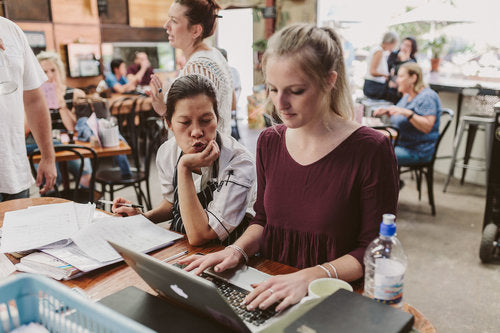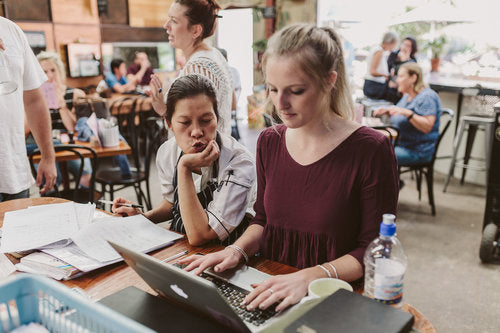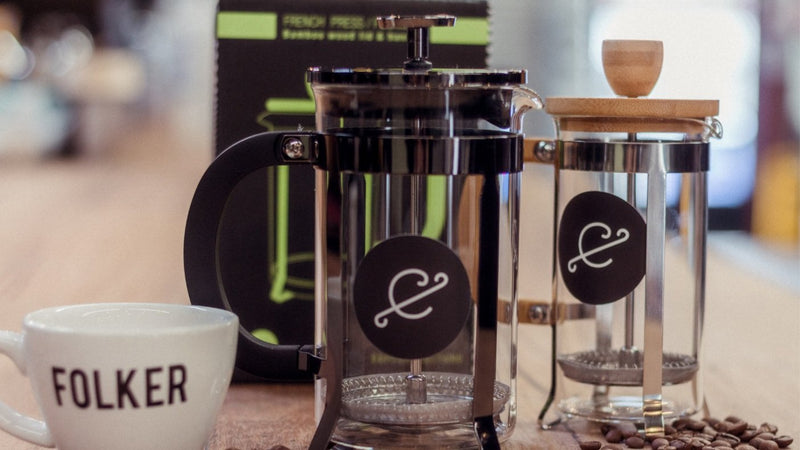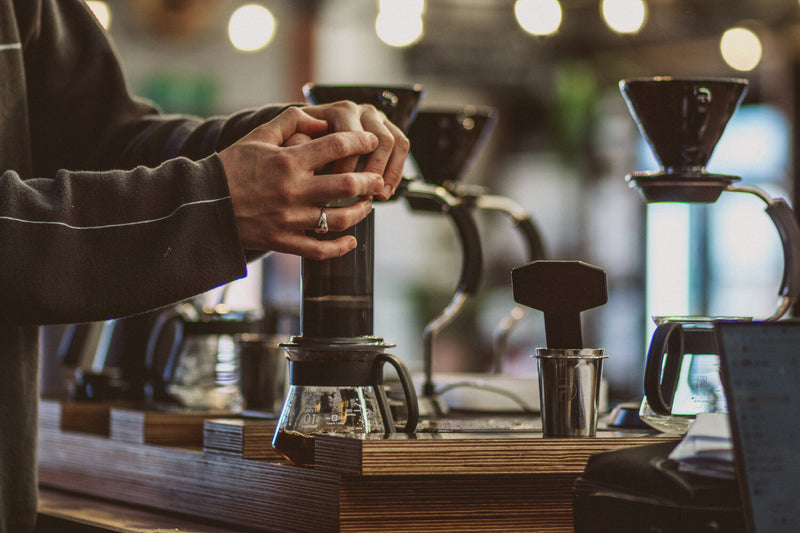I often get approached by people saying, “I really want to open a cafe I’m just not sure where to start." Well, it’s a great question to ask and I think that too often people jump straight into owning their own cafe without getting the right advice first. This is a big read, so settle in with your favourite brew.
The Essentials Of The Café Dream
I’m going to assume that if you’re reading this you probably already have your dream cafe in mind. You probably don’t need or want me to go into the details as to what I think works and what doesn’t. If you haven’t put a business plan together yet, you'd better get cracking. There are stacks of great templates online and no shortage of advice on how to develop a business case, so I won’t go into specifics here. Nor will I touch on 'industry trends' and 'what sort of cafe you should or shouldn’t open', instead I’ll focus on some of the more practical challenges faced by prospective cafe owners.
The first thing I recommend to anyone wanting to open their own cafe is to work in a cafe first. If you can, try and work in a cafe similar to the one you dream of opening. You may work in a cafe already and this puts you one step closer to your dream. However, if you’ve never done it before and you’re planning on being hands on in your own business, get some experience under your belt. If you struggle to get paid work it’s still worth offering your services in exchange for experience in your favourite local cafe. We’ve hosted a number of prospective cafe owners at Commonfolk, and all of them have found it worth while.
Cash Monies?
One of the hardest parts about opening your own cafe is deciding how to raise the capital. Do you save the money yourself? Do you search for investors? Do you approach the bank? Each person's circumstances are going to be unique, but in the end the answer to this question will always depend on what you’re looking to achieve. If your goal is to open a small hands-on coffee shop with limited fit-out and basic equipment, you might be able to finance it yourself for as little as $50K and keep the modest profits all to yourself. However, if you want an industry leading, full kitchen service cafe with the latest gear and all the bells and whistles, you might be looking at $500K+ and a new mortgage on the house. Finding business partners can be a great way to fund your cafe, however you need to be prepared to invest in the appropriate legal advice early on and develop clearly defined roles for everyone involved. I'm often asked by prospective owners, "Where can I find business partners?" and it's a great question. In reality if your idea is truly a good one, then build up the courage to approach a successful business owner or friend and ask them. Even if they don't want to invest, they may know someone who does. Never underestimate the powers of networking! In the end you have to go with what suits your needs best. There’s no one-size-fits-all solution.
The Fit Out
Once you’ve got experience, funding, and a location, you’re ready to start the most challenging part of opening a cafe - the fit out. I’ve opened a number of venues in the past and have walked alongside many new cafe owners as they try and navigate the world of tradies, deadlines, licensing, and permits and let me tell you - it is a jungle!
The very first thing I recommend you do is contact your local council and find out what building permits and food licenses you’ll require to open your cafe. Different municipalities have different rules so you’ll need to get individual advice to suit your circumstance. It is important to remember that even the rule makers can make mistakes and I recommend documenting every single interaction you have with the council (names, dates, times, what was said) so that small mistakes early on don’t end up becoming costly ones later. Nobody else cares as much about your project as you, so make sure you keep your finger on the pulse.
Once you have all your applications in, you can get started on the physical transformation of you space. You have a few choices on how you do this. Do you engage an architect or interior designer? This can cost a fair amount (often 10% of total fit out) but can be very much worth it. Having a professional opinion and advice from someone who’s been there and done that can make all the difference, especially with a costly fit out. However, if you're confident that you know your design and layout and you want to save a few pennies, then hiring a draftsperson is a cheaper alternative. My recommendation is that if you plan to spend more than $100K on your fit out, you should hire a designer. If you plan to spend less, you can probably get away with doing it yourself.
You will also have to find tradies to do the electrical, plumbing, carpentry, tiling etc. Good tradies are like gold - and can be just as rare. My suggestion is to ask around and get recommendations from people who have done similar projects. I would spend more time looking for the right tradesperson than looking for the right coffee machine. And yet so often they're the last thing a prospective cafe owner thinks about. It's easy to get a find a world-class coffee machine, but while you're rushing about trying to find a slightly cheaper deal, your bad tradie could be costing you tens of thousands of dollars! You want tradies that have a reputation for being good value (not necessarily the cheapest but one that will stick to your budget), reliable, and creative. You don't want to get stuck with a tradie that’s charging you through the nose, taking ages, and complaining the entire time. If you’re struggling to find good tradies you could consider using a building company that manage the entire fit out for you; however this will probably cost you more than an architect.
Once your design is settled and the tradies are tinkering away with the fit out you should move your mind into operations mode. What coffee will you serve? What type of food do you want to offer? What staff will you require to offer these services? My tip… Make a list of everything your cafe will offer and work your way backwards. You want to serve food so you’ll need chefs, raw material suppliers, kitchen equipment, printed menus, a grease trap, garbage disposal, etc the list goes on. For each item on the list there may be 10 other items that spring up and you need to account for them all. When you finish developing your list with all the items you need to purchase or plan for, you can start working forwards towards the end goal.
The Supplies...
I could go into a lot of detail about different suppliers for different products but once again if you ask around at local cafes you enjoy, most will happily share with you who they use. Otherwise, a quick Google search usually produces the goods. Given that, I won't waste more time on this section. Now, you're probably not going to be around for too long if you don't do great coffee - especially if you're in Melbourne - so I’ll share some insights into choosing a coffee supplier below.
The Coffee Is Obviously Important When Opening A Café
Your coffee supplier (depending on your business model) will be responsible for the product that makes you anywhere between 50-100% of your revenue, so it’s super important to get it right. When it comes to coffee my opinion is always quality first. That’s not to say you have to use a $100 per kg gesha coffee for your house blend, but what you won’t get away with is trying to dress mutton up as lamb. If you feel yourself tempted to go with a major corporate brand because they're offering free equipment, umbrellas, barriers, cups, chairs, fit out, cash etc remember that they’re only doing so because they sell cheap crappy coffee so they have the margins to pay for all that other stuff (that you should really budget for anyway). Customers will talk with their feet and you simply won’t see many return for a second cup if your product is sub-standard. If you don’t believe me, have a look at the busiest cafes in your local area and take note of the type of coffee they sell. I guarantee it will be from a quality-focused, locally owned roaster. Cafes using crap coffee are getting forced out of business at a rapid rate.
So you’re going to use good coffee. Which good coffee should you use? In the past, great specialty coffee roasters were few and far between which often made choosing one pretty easy. These days there is myriad great companies you could choose, so you need to find the one that suits you. The size of the company can be really important. If a company is really big and has heaps of other cafes on the books, you might find that service can be a little disconnected and impersonal.
However, if you choose a smaller company you might be treated like royalty—but you will be exposed to a higher level of risk if they have an equipment failure etc. Personally (and maybe in a self serving way) I think that partnering with a smaller company has far more pros than cons. Not only do they have the flexibility to tailor a coffee offering to suit your individual needs, but you’ll probably find that they value you more and in turn offer better value across the board.
From a product point of view it would be worth getting your head around the latest industry standards of quality control etc. I would ask my roaster:
- about the recipes they use for espresso / filter coffee,
- what their quality control process is,
- whether they taste every roast using the brew method it is intended for,
- what software or technology (if any) they use to support their QC and recipe development ,
- how they source their green coffee,
- whether their beans are direct trade / organic / specialty,
- and simply any general information about all the coffees they offer.
Support? Important But Often Forgotten
If your roaster can’t answer / understand these questions it’s time to get a new roaster. One final thing to consider is whether your coffee roaster can provide you with adequate training and support.
At Commonfolk we run personalised training for all our accounts as well as regular open training sessions at our roastery. If you want your staff to make coffee as well as you do, then you need a roaster that can help train them properly. I see this as a minimum requirement from any coffee roastery worth their salt.
Equipment support can be a little trickier as not many companies have their own qualified technicians. However, any good roaster should know how to replace seals or shower screens, and change over burrs on grinders and water filtration systems for espresso machines. If a major breakdown occurs your coffee supplier should also be able to point you in the right direction for serious technical support.
Coffee Supplier Do's & Don'ts
Do
- Choose quality over price
- Demand a high level of coffee knowledge
- Demand a high level of training and support
- Partner with people who care about your business
Don't
- Choose a company that offers heaps of ‘free’ gear (you’re paying for it somehow)
- Choose a company that lacks product knowledge
- Confuse marketing ploys for true facts
- Make a quick uninformed decision
Staff! Your most important asset and biggest headache.
Unless you’ve been living under a rock, you will have heard that Australia is suffering from a shortage of skilled hospitality workers. Finding the right people and keeping them is truly an art form, and it defines the best cafes from the rest.
You’ll likely be tempted to prioritise experience over all else however this comes with it’s own issues. Firstly, you’re probably going to struggle to find them. Secondly, just because someone has a lot of experience doesn’t mean they’ll be a good fit for your business. People can come with rusted on bad habits, opinions on how things should run that are contrary to your vision, and there’s every chance that they were never adequately trained in the first place.
I always encourage cafe owners to develop a robust onboarding process and ongoing professional development for their teams. At Commonfolk every single front of house team member completes our barista course. Instead of hiring for experience, try hiring for attitude, culture fit and willingness to learn.
Interested in seeing how Commonfolk can help you deliver a world-class coffee offering? Click here.

 Cart
Cart



